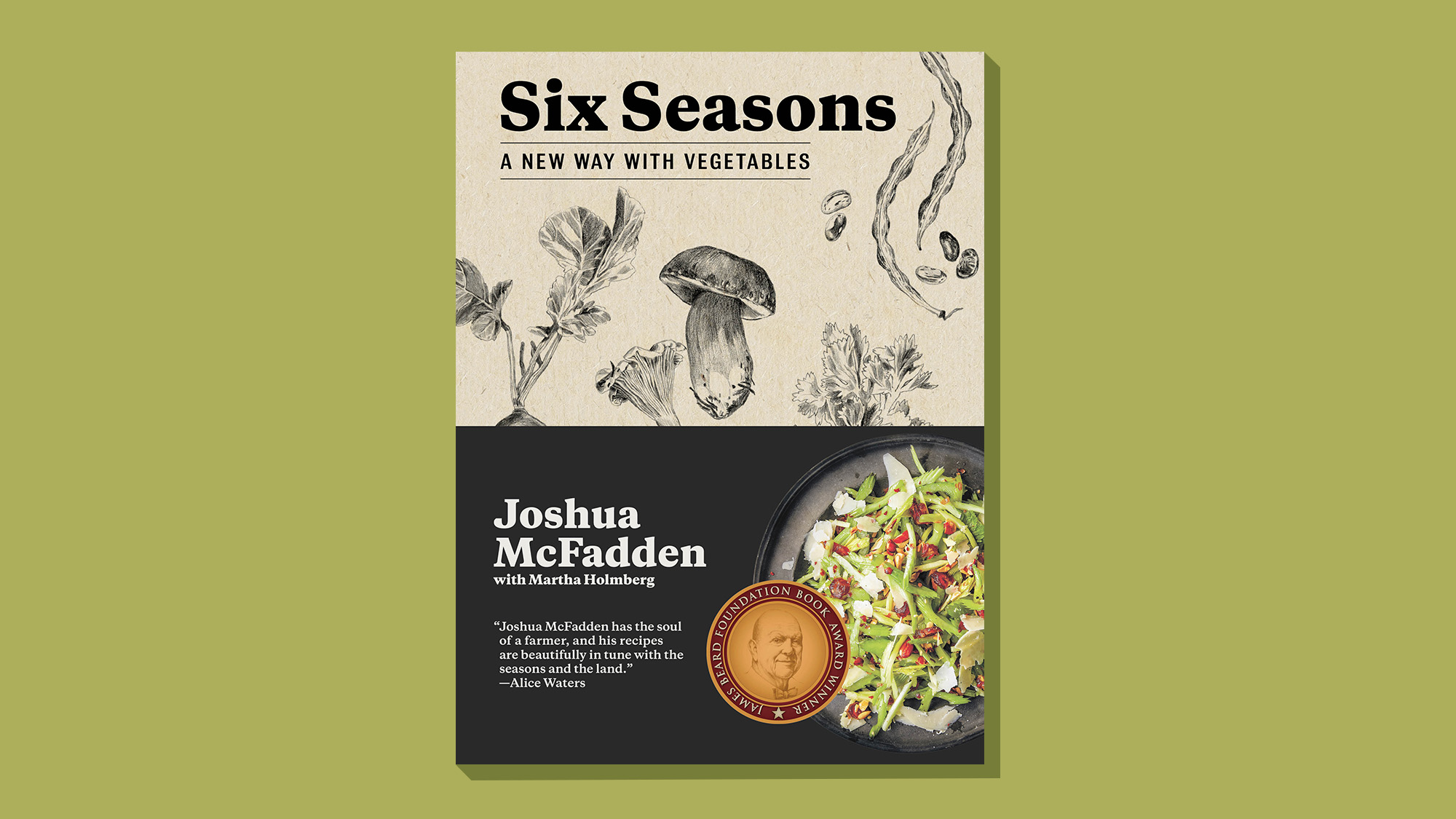One great cookbook: 'Six Seasons: A New Way with Vegetables'
Fresh ways with dozens of vegetables ensure restaurant-quality cooking at home


A free daily email with the biggest news stories of the day – and the best features from TheWeek.com
You are now subscribed
Your newsletter sign-up was successful
When you make a purchase using links on our site, The Week may earn a commission. All reviews are written independently by our editorial team.
Restaurants are not home kitchens. An obvious statement, yet a pertinent one in the cookbook ecosphere.
Too many cookbooks from restaurants or chefs are impassable for the everyday cook. Their recipes, to conjure a restaurant's dishes, often require an array of complicated sub-recipes. This tracks for restaurant cooking, where much of the preparation is done in advance so that the cooking done during lunch or dinner service is more akin to assembling. More working ahead equals food getting to the guests faster.
Home cooking, on the other hand, demands real-time success with minimal — if any — advance cooking. "Six Seasons: A New Way with Vegetables," by Joshua McFadden and Martha Holmberg, is one of the rare chef books that provides a window into why restaurant food is so delicious, with applicable tools you can exercise in your own kitchen.
The Week
Escape your echo chamber. Get the facts behind the news, plus analysis from multiple perspectives.

Sign up for The Week's Free Newsletters
From our morning news briefing to a weekly Good News Newsletter, get the best of The Week delivered directly to your inbox.
From our morning news briefing to a weekly Good News Newsletter, get the best of The Week delivered directly to your inbox.
Season like you mean it
The cooking at the best restaurants tastes good. That is because chefs have acquired tricks and a personal style to bring out the best in their ingredients. One of McFadden's signature moves, for example, is to season his salads with salt and acid before adding oil. This is a 180-turn from the standard salad-making format, in which you dress the salad with salt and oil first, then add either vinegar or citrus to taste.
McFadden's salads whir with vibrant life. Consider the celery salad with dates, almonds and Parmigiano. The celery stalks are sliced on an angle and then soaked in ice water so they become all-the-crisper. They are then drained and added to a bowl with chopped toasted almonds, chile flakes, chopped dates and a thump of lemon juice. The reader is instructed to season the mixture with salt and pepper and adjust the seasonings so that, as the intro to the "Six Seasons" notes, the salad tastes "like a potato chip. Meaning so tasty and savory that you can't help but take one more bite … and another." Then and only then is the olive oil and shaved Parmesan added. This kind of salad-making detonates, an eruption of bright vegetable fireworks.
McFadden's innovative techniques appear in endless guises across the book, which is organized into six sections that correspond to his framing of the six growing seasons: spring; early summer; midsummer; late summer; fall; and winter. Each chapter is then divided into subchapters by the vegetables that grow during that season and recipes to illuminate those vegetables. Cauliflower is roasted and mixed with plums, yogurt and sesame seeds. Fresh corn is tossed with walnuts, scallions, mint, lime and Pecorino Romano. Potatoes are baked, then crushed and fried with garlic, rosemary and thyme and finished with lemon juice.
An able assist
McFadden is a virtuosic cook; that means nothing to a reader without an agile translator. His co-author, Martha Holmberg, is a veteran food writer who has been entrenched in the recipe world for decades. Her ability to convert technique into practicability is the book's covert weapon.
A free daily email with the biggest news stories of the day – and the best features from TheWeek.com
She insists on precise measurements when appropriate; other times she calls for a "healthy glug" of olive oil. She tells you all the cues you need to know when the garlic for wilted kale is ready: "cook slowly to toast the garlic so it's very soft, fragrant and nicely brown — but not burnt." With Holmberg's sure hand and McFadden's exceptional vegetable prowess, you can cook your way across six seasons, 41 vegetables and nearly 400 pages and never encounter a single recipe that flops.
Scott Hocker is an award-winning freelance writer and editor at The Week Digital. He has written food, travel, culture and lifestyle stories for local, national and international publications for more than 20 years. Scott also has more than 15 years of experience creating, implementing and managing content initiatives while working across departments to grow companies. His most recent editorial post was as editor-in-chief of Liquor.com. Previously, he was the editor-in-chief of Tasting Table and a senior editor at San Francisco magazine.
-
 Political cartoons for February 16
Political cartoons for February 16Cartoons Monday’s political cartoons include President's Day, a valentine from the Epstein files, and more
-
 Regent Hong Kong: a tranquil haven with a prime waterfront spot
Regent Hong Kong: a tranquil haven with a prime waterfront spotThe Week Recommends The trendy hotel recently underwent an extensive two-year revamp
-
 The problem with diagnosing profound autism
The problem with diagnosing profound autismThe Explainer Experts are reconsidering the idea of autism as a spectrum, which could impact diagnoses and policy making for the condition
-
 Tourangelle-style pork with prunes recipe
Tourangelle-style pork with prunes recipeThe Week Recommends This traditional, rustic dish is a French classic
-
 Book reviews: ‘Hated by All the Right People: Tucker Carlson and the Unraveling of the Conservative Mind’ and ‘Football’
Book reviews: ‘Hated by All the Right People: Tucker Carlson and the Unraveling of the Conservative Mind’ and ‘Football’Feature A right-wing pundit’s transformations and a closer look at one of America’s favorite sports
-
 One great cookbook: Joshua McFadden’s ‘Six Seasons of Pasta’
One great cookbook: Joshua McFadden’s ‘Six Seasons of Pasta’the week recommends The pasta you know and love. But ever so much better.
-
 Book reviews: ‘Vigil: A Novel’ and ‘Fear and Fury: The Reagan Eighties, the Bernie Goetz Shootings, and the Rebirth of White Rage’
Book reviews: ‘Vigil: A Novel’ and ‘Fear and Fury: The Reagan Eighties, the Bernie Goetz Shootings, and the Rebirth of White Rage’Feature Taking on the space between life and death and a look back at a 1984 shooting that shocked New York City
-
 The best fan fiction that went mainstream
The best fan fiction that went mainstreamThe Week Recommends Fan fiction websites are a treasure trove of future darlings of publishing
-
 Book reviews: ‘The Mattering Instinct: How Our Deepest Longing Drives and Divides Us’ and ‘Family of Spies: A World War II Story of Nazi Espionage, Betrayal, and the Secret History Behind Pearl Harbor’
Book reviews: ‘The Mattering Instinct: How Our Deepest Longing Drives and Divides Us’ and ‘Family of Spies: A World War II Story of Nazi Espionage, Betrayal, and the Secret History Behind Pearl Harbor’Feature The pursuit of ‘mattering’ and a historic, devastating family secret
-
 The best dark romance books to gingerly embrace right now
The best dark romance books to gingerly embrace right nowThe Week Recommends Steamy romances with a dark twist are gaining popularity with readers
-
 Book reviews: ‘American Reich: A Murder in Orange County; Neo-Nazis; and a New Age of Hate’ and ‘Winter: The Story of a Season’
Book reviews: ‘American Reich: A Murder in Orange County; Neo-Nazis; and a New Age of Hate’ and ‘Winter: The Story of a Season’Feature A look at a neo-Nazi murder in California and how winter shaped a Scottish writer
